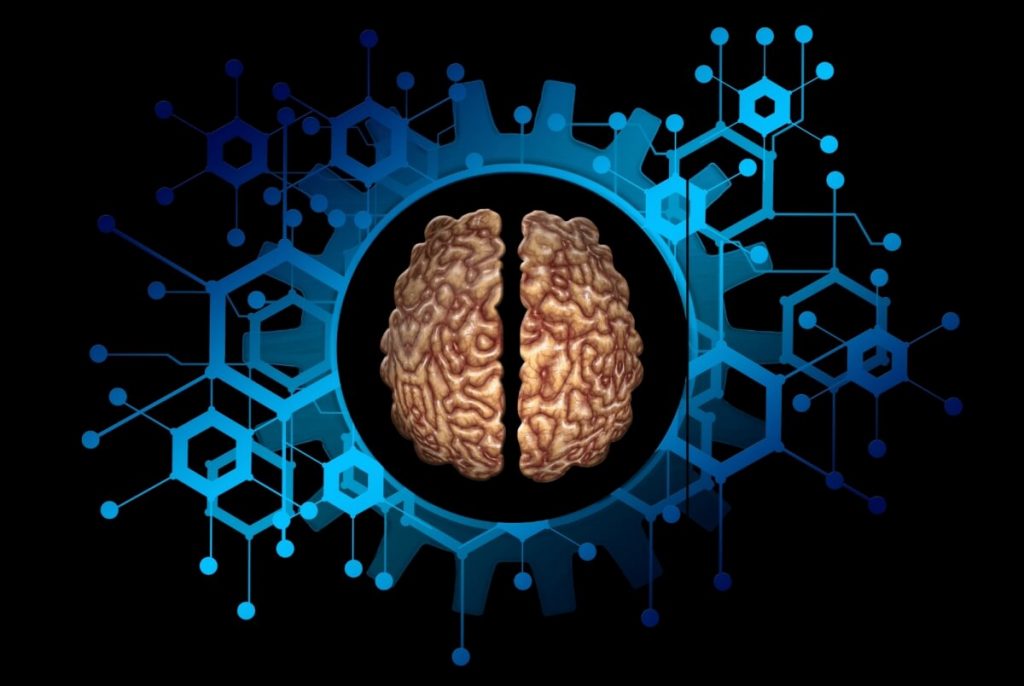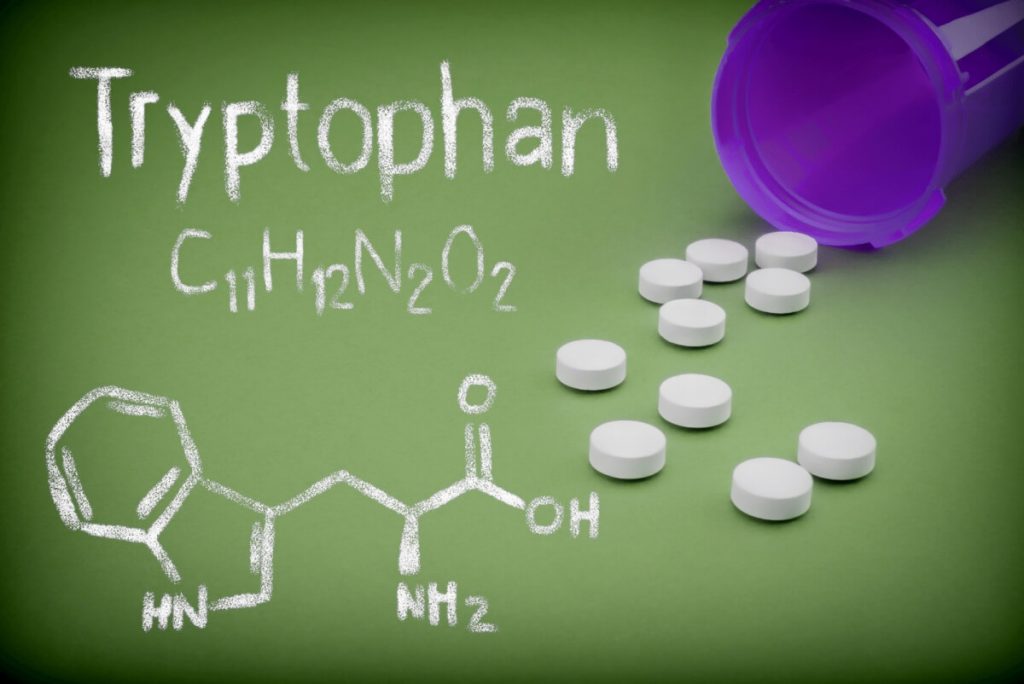What Is 5-Htp, And Where Does It Come From?
L-5-hydroxytryptophan, or 5-HTP, comes from tryptophan which is an essential amino acid. Tryptophan hydroxylase is the enzyme that converts tryptophan to 5-HTP by adding a water molecule.
Furthermore, the process of decarboxylation yields serotonin, a neurotransmitter that’s crucial for cognition, learning, sleep, and mood. The conversion of serotonin to melatonin plays a huge role in the regulation of the sleep-wake cycle.
Serotonin outside the brain can’t cross the Blood-Brain Barrier (BBB). However, tryptophan and 5-HTP can cross the BBB.
There are many natural 5-HTP sources. Plants are a great source, such as the seeds of African Griffonia simplicifolia. Other rich sources of 5-HTP include intertidal sponges and mushrooms.
Interestingly, the bacteria Chromobacterium violaceum also naturally performs tryptophan hydroxylation. Its bacterial tryptophan hydroxylase has certain characteristics of the mammalian one.

Health Benefits of 5-HTP
Sleep
5-HTP is a melatonin precursor. Melatonin is a hormone from the pineal gland that regulates the day-night and sleep-wake cycle. Thus, 5-HTP has beneficial effects on sleep.
In one study, 8 healthy, young adults received either a placebo pill or a 200 mg 5-HTP pill for 17 nights. Their rapid eye movement (REM) sleep increased by 53% compared to placebo baseline.
Another study on 20 older adults with poor sleep quality investigated the effects of 5-HTP on sleep quality. Participants either received 100 mg of 5-HTP every day for 12 weeks, or did not receive anything. The 5-HTP group fell asleep faster after 8 weeks of the supplementation, while the control group still reported the same poor sleep quality.
In animal models, when 5-HTP and GABA were administered together, they significantly improved sleep quality and regulated sleep duration more than either 5-HTP or GABA alone.
Mood And Mental Health
5-HTP is a serotonin precursor. Serotonin plays a major role in mood and cognition.
Inhibiting tryptophan hydroxylase and tryptophan reduction in the diet significantly reduces serotonin levels, which correlates with bad mood. However, women experience low mood more frequently than men upon tryptophan reduction. Also, individuals who have a family history of depression experience much more extreme changes in the mood upon tryptophan reduction.
5-HTP may help with mood in some cases. However, it’s important to never mix 5-HTP with other formulas that may increase serotonin without a doctor’s supervision as it can lead to serotonin syndrome, a potentially life-threatening condition.
Furthermore, 5-HTP also promotes calmness and relaxation. A 12-week long study aimed to demonstrate this, with 10 participants receiving an increasing dosage (20 to 300 mg) of 5-HTP, 3 times a day. Participants reported a significant increase in calmness.
Incorporating tryptophan or 5-HTP into the diet can also improve mood, attention, and memory.
Reduces Appetite And Weight Loss
5-HTP also helps with weight loss by reducing appetite. Hypothalamic serotonin (5-HT) has a role in satiety, likely due to 5-HT1B and 5-HT2C receptors.
A study included 20 overweight individuals who received either a placebo or 900 mg of 5-HTP per day over 12 weeks. The 5-HTP group showed significant weight loss and felt satiated for longer.
Similar results exist in a number of studies – 19 overweight women received either a placebo or 8 mg/kg of 5-HTP daily for 5 weeks. Women in the 5-HTP group had a lower appetite, and also lost on average 1 kilogram (2.2 lbs) more weight compared to the placebo group.

Side Effects Of 5-HTP
Excess supplementation with 5-HTP might lead to some side effects, including:
- Diarrhea and frequent defecation
- Nausea
- Heartburn and acid reflux
- Stomach rumbling
- Stomach fullness and dizziness
- Serotonin syndrome
In one study investigating the relaxing effects of 5-HTP, some side effects occurred in participants. Namely, participants experienced diarrhea and frequent defecation. However, these side effects correlate with the dosage– participants that had these side effects received 225 mg of 5-HTP per day. Participants’ states improved after lowering the dose to 150 mg of 5-HTP per day [R7].
Furthermore, excess 5-HTP and serotonin can cause other gastrointestinal issues like:
- Nausea
- Heartburn
- Rumbling
- Feelings of fullness
- And dizziness
The reports of oral 5-HTP side effects in the literature is why we only include 5 mg of 5-HTP in a spray.
Serotonin syndrome is when you have too much serotonin in your nervous system. Supplements or medications that increase serotonin levels (like 5-HTP) can lead to serotonin syndrome. The symptoms might range from mild to severe.
Mild symptoms are:
- Diarrhea
- Fever
- Sweating
- Confusion
More severe symptoms include:
- Rigidity
- Seizures
- Very high fever
5-HTP Dosages
In order to avoid the negative side effects of excess supplementation, 5-HTP dosages should not be too high.
It is best to keep the dose below 200-300 mg, many studies observe a higher risk of side effects at doses higher than 200-300 mg of 5-HTP.
To improve your sleep quality, you can incorporate 5-HTP in your bedtime routine. The combination of 5-HTP and GABA significantly improves sleep quality. Try Sleep Breakthrough and Dream Optimizer 30 minutes before bedtime.
Always consult your medical professional before making any changes in your diet and supplement regime, especially if you’re taking medications.
References:
- Maffei ME. 5-hydroxytryptophan (5-HTP): Natural occurrence, analysis, biosynthesis, biotechnology, physiology and toxicology. Int J Mol Sci. 2020;22(1):181. doi:10.3390/ijms22010181
- Wyatt RJ, Zarcone V, Engelman K, Dement WC, Snyder F, Sjoerdsma A. Effects of 5-hydroxytryptophan on the sleep of normal human subjects. Electroencephalogr Clin Neurophysiol. 1971;30(6):505-509. doi:10.1016/0013-4694(71)90147-7
- Sutanto C, Heng CW, Gan AX, Wang X, Fam J, Kim JE. The impact of 5-hydroxytryptophan supplementation on sleep quality of older adults in Singapore: A randomized controlled trial. Curr Dev Nutr. 2021;5(5140372):5140372. doi:10.1093/cdn/nzab037_082
- Hong KB, Park Y, Suh HJ. Sleep-promoting effects of the GABA/5-HTP mixture in vertebrate models. Behav Brain Res. 2016;310:36-41. doi:10.1016/j.bbr.2016.04.049
- Jenkins TA, Nguyen JCD, Polglaze KE, Bertrand PP. Influence of tryptophan and serotonin on mood and cognition with a possible role of the gut-brain axis. Nutrients. 2016;8(1):56. doi:10.3390/nu8010056
- Jangid P, Malik P, Singh P, Sharma M, Gulia AKD. Comparative study of efficacy of l-5-hydroxytryptophan and fluoxetine in patients presenting with first depressive episode. Asian J Psychiatr. 2013;6(1):29-34. doi:10.1016/j.ajp.2012.05.011
- Kahn R, Westenberg HGM. L-5-Hydroxytryptophan in the treatment of anxiety disorders. J Affect Disord. 1985;8(2):197-200. doi:10.1016/0165-0327(85)90046-1
- Halford JCG, Harrold JA, Lawton CL, Blundell JE. Serotonin (5-HT) drugs: effects on appetite expression and use for the treatment of obesity. Curr Drug Targets. 2005;6(2):201-213. doi:10.2174/1389450053174550
- Cangiano C, Ceci F, Cascino A, et al. Eating behavior and adherence to dietary prescriptions in obese adult subjects treated with 5-hydroxytryptophan. Am J Clin Nutr. 1992;56(5):863-867. doi:10.1093/ajcn/56.5.863
- Ceci F, Cangiano C, Cairella M, et al. The effects of oral 5-hydroxytryptophan administration on feeding behavior in obese adult female subjects. J Neural Transm. 1989;76(2):109-117. doi:10.1007/bf01578751
- Turner EH, Blackwell AD. 5-Hydroxytryptophan plus SSRIs for interferon-induced depression: synergistic mechanisms for normalizing synaptic serotonin. Med Hypotheses. 2005;65(1):138-144. doi:10.1016/j.mehy.2005.01.026
- Francescangeli J, Karamchandani K, Powell M, Bonavia A. The serotonin syndrome: From molecular mechanisms to clinical practice. Int J Mol Sci. 2019;20(9):2288. doi:10.3390/ijms20092288
